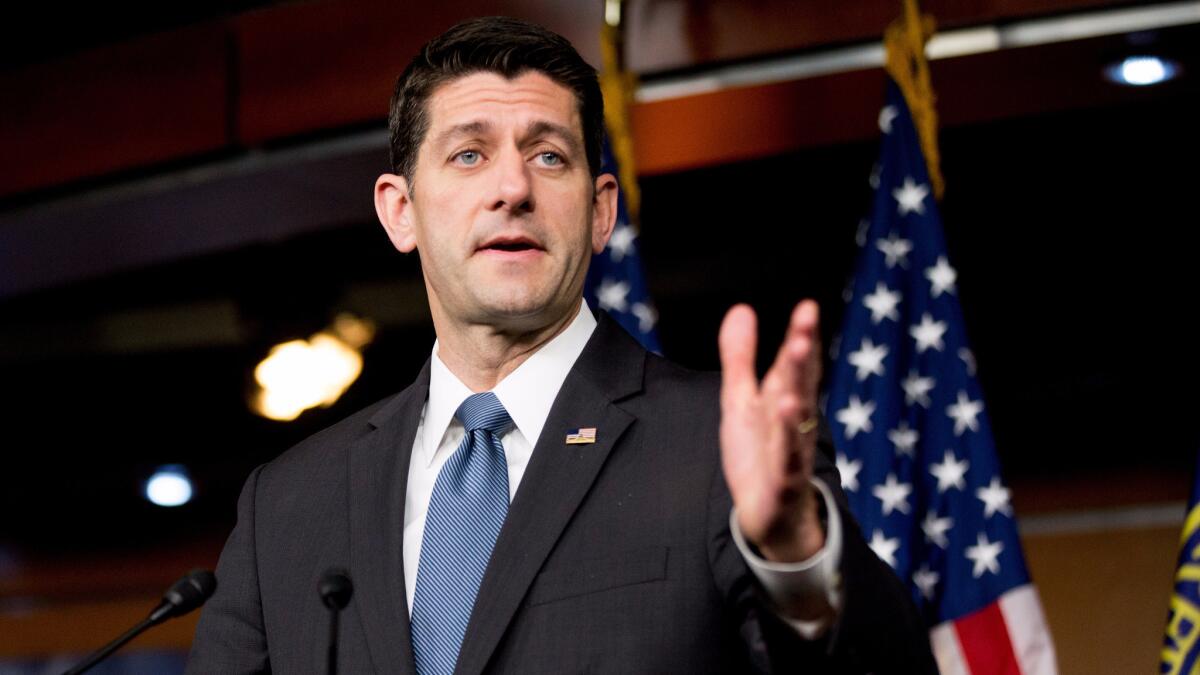Congress and White House strike debt rescue deal for Puerto Rico

- Share via
House Republicans and Democrats reached a rare election-year deal with the White House to try to rescue Puerto Rico from $70 billion in debt as millions of Americans in the cash-strapped U.S. territory struggle with the loss of basic services.
A revised House bill introduced late Wednesday would create a board to help manage the territory’s financial obligations and restructure some debt. Negotiations between the Obama administration and House Speaker Paul D. Ryan’s office helped finalize the legislation.
It is a “fair but tough bipartisan compromise,” Treasury Secretary Jacob J. Lew said.
Ryan (R-Wis.) said the legislation would prevent an eventual taxpayer bailout.
Puerto Rico, mired in a decadelong recession, already has missed several payments to creditors. A $2 billion installment, the largest yet, is due July 1.
See the most-read stories this hour >>
The island’s businesses have shuttered, schools lack sufficient resources like electricity, and some hospitals are limiting treatment or drugs. Puerto Rico’s governor used a state of emergency this week to protect one public agency from lawsuits.
Further complicating Puerto Rico’s outlook is the Zika virus, which has hit the territory of 3.5 million people hard. More than 700 cases have been reported; Zika can cause severe birth defects.
Like U.S. states, Puerto Rico cannot declare bankruptcy. The legislation would allow the control board to oversee negotiations with creditors and the courts over reducing some debt.
The compromise “achieved a restructuring process that can work,” House Democratic leader Nancy Pelosi said.
A vote could happen next week in the Natural Resources Committee. The panel’s chairman, Rep. Rob Bishop (R-Utah), had to cancel a vote last month amid objections from both parties.
Since then, Bishop and Ryan have worked to win over conservatives who worry the rescue might set a precedent for financially ailing states. Democrats, too, had to be persuaded the control board wouldn’t be too powerful or debt restructuring too difficult.
Some of the House’s most conservative Republicans appear willing to support the deal. Republican Rep. Raul Labrador of Idaho, a native Puerto Rican and member of the fiscally conservative Freedom Caucus, spoke favorably of the effort.
“What I have seen so far, I believe this is a good bill that will get a majority of Republican support and will actually go through both houses of Congress,” Labrador said, stopping short of a full endorsement.
The Senate hasn’t yet acted. Senate Majority Leader Mitch McConnell (R-Ky.) has said the chamber is waiting for the House to move first.
Disagreements over how the board would be appointed held up negotiations over the last week. The bill would empower President Obama to select all but one of the members from lists provided by congressional leaders. Anyone Obama picks from outside that list must be confirmed by the Senate.
In a nod to Democrats, the final bill also removes a provision that would have transferred federal land on the nearby island of Vieques to Puerto Rico’s government. But Puerto Rico would be allowed to temporarily lower federal minimum-wage requirements for some workers, which Democrats have opposed.
Still, Puerto Rican Gov. Alejandro Garcia Padilla of the Popular Democratic Party said the bill still wasn’t “consistent with our country’s basic democratic principles.” He wants a less powerful board that can’t fully control the island’s finances.
Under the legislation, the control board would require Puerto Rico to create a fiscal plan. That includes directing the territory to provide adequate funds for public pensions, which the government has underfunded by more than $40 billion.
The Obama administration has pushed to make pensions a priority. That has creditors worried they would take a back seat to pension obligations. Bishop says the control board is designed to ensure all are paid.
While supportive, Lew’s statement said: “Congress must stand firm and resist calls from financial interests to undermine this effort every step of the way — in committee, on the House floor and in the Senate.”
Others were less positive. Dan Holler, Heritage Action for America’s spokesman, said the conservative group was “very skeptical” that the bill is now more conservative.
Democratic presidential candidate Bernie Sanders, looking ahead to the territory’s June primary, said the legislation favors Wall Street over the island’s people.
“We must stop treating Puerto Rico like a colony and start treating the people of Puerto Rico with the respect and dignity that they deserve,” Sanders said.
More than 200,000 people have left Puerto Rico in the last five years as the island’s financial problems have worsened after setbacks in the wider U.S. economy.
“I hope every member of Congress will bear in mind that the collapse of the bill could mean the collapse of Puerto Rico’s government,” said Democrat Pedro R. Pierluisi, Puerto Rico’s representative in Congress.
ALSO
Trump announces list of potential Supreme Court picks, including one who has repeatedly mocked him
Sanders and Democratic officials are engaged in an escalating dispute over Nevada violence
More to Read
Sign up for Essential California
The most important California stories and recommendations in your inbox every morning.
You may occasionally receive promotional content from the Los Angeles Times.













